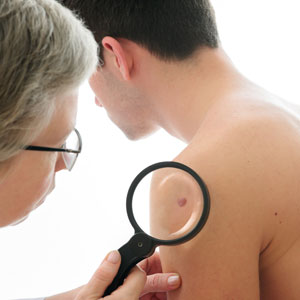Skin cancer is concerning, we understand this and treat our patients with the utmost care from the time we begin the process of diagnosing an abnormality in the skin. The most common procedure through which Huntington dermatologist Dr. Roger Koreen may confirm or rule out skin cancer is the standard biopsy. From the very onset of care, our patients can expect a full explanation of everything that we do. Additionally, we take the time to answer questions, knowing that information brings peace of mind.

How a biopsy may be performed
A sample of skin tissue may be extracted in several different ways. Two common methods are the excisional biopsy, also called a punch biopsy, and the shave biopsy. An excisional biopsy is performed when we need to collect surface cells as well as tissue located in the dermis. The shave biopsy involves removing a precise amount of tissue from the surface. The depth of this biopsy is determined based on the location of the lesion and its characteristics. In each method of biopsy, we begin by numbing the treatment area with local anesthetic. After the initial injection, patients feel no discomfort.
Caring for the biopsy site
Regardless of the type of biopsy you have, the site will be covered with gauze for 24 hours. Once the dressing can be removed, mild soap may be used to wash the area as needed. It is important to use unscented soap without dye or drying chemicals. Keeping the skin moistened facilitates healing. This may be maintained with applications of an appropriate ointment, such as Aquaphor®. As long as the biopsy site is covered with ointment, there is no need to apply gauze.
What to avoid
There are certain medications, supplements, and activities that should be avoided in the first week or so after a biopsy. These include:
- Alcohol
- Aspirin, unless prescribed by your physician
- Fish oil or vitamin E supplements
- Naproxen
- Ibuprofen
The use of any of these substances or medications can increase bleeding. In addition, we recommend that the area of skin from which a biopsy is taken be left intact during recovery. This means that movements that would tug or pull at the skin should be avoided. Modifications in movement are based on the area of the biopsy.
Dr. Roger Koreen and his staff have treated numerous patients for skin cancer. We provide a level of care through which your peace of mind can increase. To schedule a skin cancer screening or learn more about our services, call (631) 417-3300.









